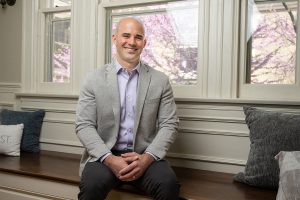Subscriber Benefit
As a subscriber you can listen to articles at work, in the car, or while you work out. Subscribe Now
Dentons Bingham Greenebaum
Indiana University Robert H. McKinney School of Law, 2017
Why did you decide to enter the legal profession?
Coming from a family of doctors and scientists, I was pushed toward the practice of medicine from a very early age. Not understanding there was another viable choice, I reluctantly followed the path for too long, until I finished my first semester of college. I’m still unsure whether I just found my agency or if my first semester grades finally convinced those around me that medicine wasn’t my calling, but I quickly changed my major. Hey … I warned ‘em!
In the following semesters I found interest in political science, sociology and the interaction between the two, specifically how society operates within a system of laws and government. I followed that interest to law school, and the rest is history.
If you hadn’t pursued a legal career, what would you be doing?
If money were no object, I would be a rally racecar driver. Realistically, if not for law, I would likely be involved in the owning and managing of residential real estate or a hospitality entrepreneur.
Who is someone who has inspired you in your career?
My uncle is the first person who inspired me to strive toward a career doing something I love. Being a first generation American born to a family of immigrants, I have always been a witness to incredible work ethic, dedication and the fruits that disciplined labor can bear. Among my family of grinders, my uncle emphasized the value of enjoying what he does and the people with whom he works. Even now, as he has well surpassed a normal retirement age, he will say, “Why would I stop? I’m having fun.”
I kept my uncle in mind when choosing a career path and continue to reflect on his influence from time to time. Particularly so when I was recently asked, “How do you do it, how do you work so much?,” to which I answered without pause, “Well … I’m tired, but never when I’m working.” He may practice medicine and we may be at very different stages of professional lives, but I know for certain that our careers have the most important aspect in common.
What’s the best advice you’ve ever received?
Any time spent working is time spent away from family, so make it count.
What makes a good lawyer/judge?
The best lawyers invest in the development of other lawyers. A knowledgeable and productive lawyer is great, but those who are patient and take an interest in the development of others build a committed team able to accomplish much more than one person can do alone. Developing a practice that can support the building of team is one of my biggest professional aspirations.
What is something you wish people knew about lawyers?
We don’t all practice criminal defense or litigation! The idea of arguing in court is fun and dramatized in movies, but what about negotiating a favorable rep, warranty and indemnification package!? Sign me up for that premiere …
Do you have a secret talent?
I’m oddly good at unconventional sports. Skiing? Avid. Sailing? Call me Skipper. Scuba? I’m your guy. Just don’t pick me for your gym league basketball team.
What’s the value of having both an MBA and a J.D.?
Law school teaches you to think like a lawyer, but no legal education can prepare you to think and operate like a business or its stakeholders. Starting the MBA program during law school and finishing two years after beginning practice offered me the opportunity to impact my legal education and initial growth as a practicing attorney with financial and management skills, as well as a sound business perspective. These skills carry through to my practice on a daily basis, where tasks as simple as reading and understanding financial statements to more complex strategic planning, projection analyses and creation of complex financial models continue to be key competitive competencies. There are certainly nonlegal advisers who can provide these services, but coupling those hard skills together with legal advice can add significant value and work in harmony toward finding practical solutions to legal and quasilegal issues.
Tell us about your work with 1 Like Me Inc.
I currently sit on the board of directors of Thomas Ridley’s 1 Like Me Inc., an Indianapolis based nonprofit organization offering reentry services to those returning to our central Indiana communities from jail or prison. My involvement in 1 Like Me stems from involvement during law school in the REACH Program in partnership with the U.S. District Court for the Southern District of Indiana and as a founder of the Second Chance Re-Entry Assistance Program, a law student organization dubbed SCRAP.
Practicing corporate law is fulfilling, but I have a public service bent that I will never be able to ignore. I understand the deleterious effects a criminal charge or conviction can have on an individual’s life and opportunities for socioeconomic mobility. Being part of 1 Like Me gives me comfort that I am doing what I can to ensure a true second chance to those who have paid their dues to society.
How do you spend your free time?
My guilty pleasure is washing and detailing our cars — think Zen garden. When I’m not in the garage, most of my free time is spent with my wife and our dogs, on the lake or traveling.•
Please enable JavaScript to view this content.
